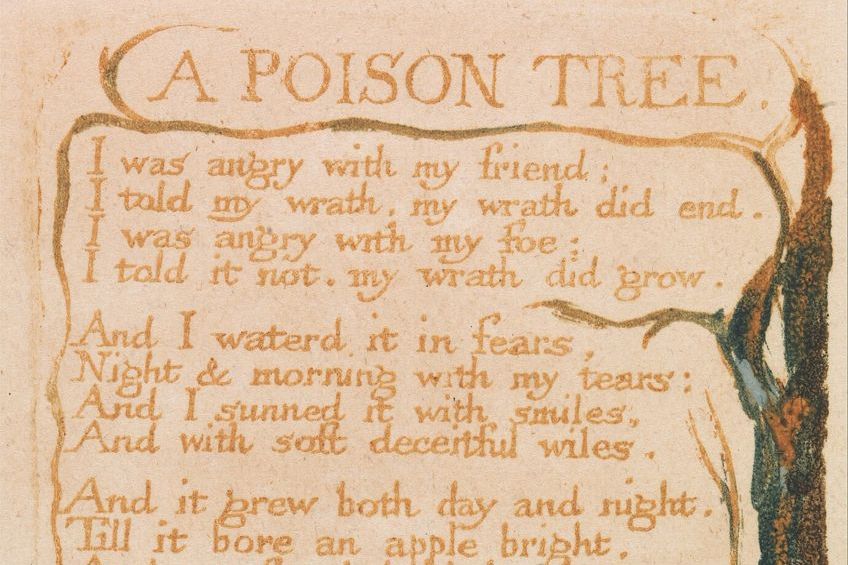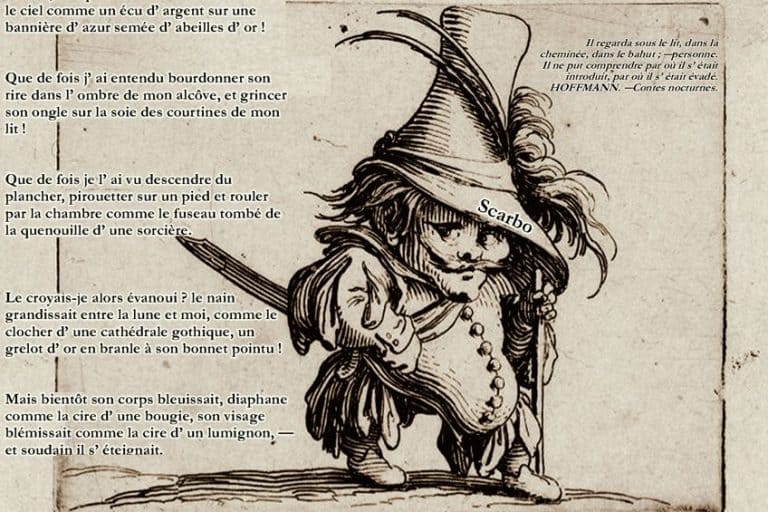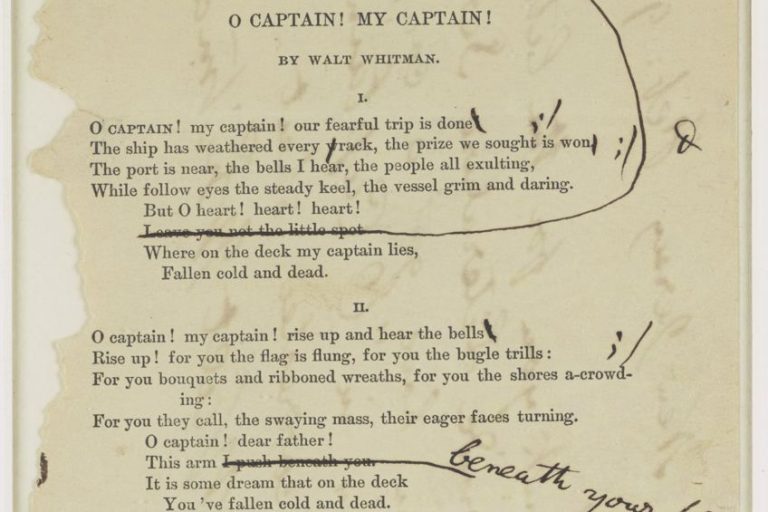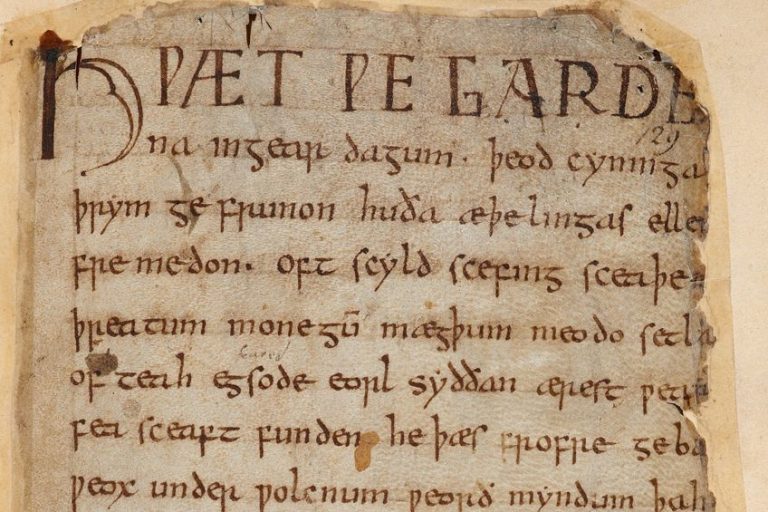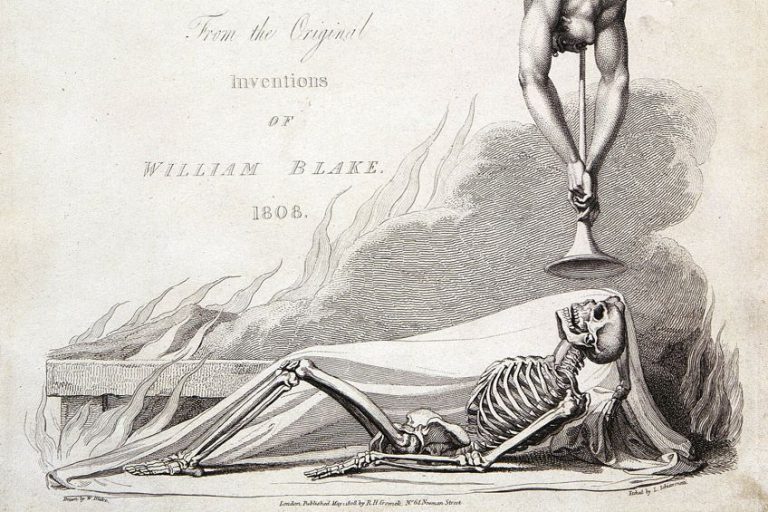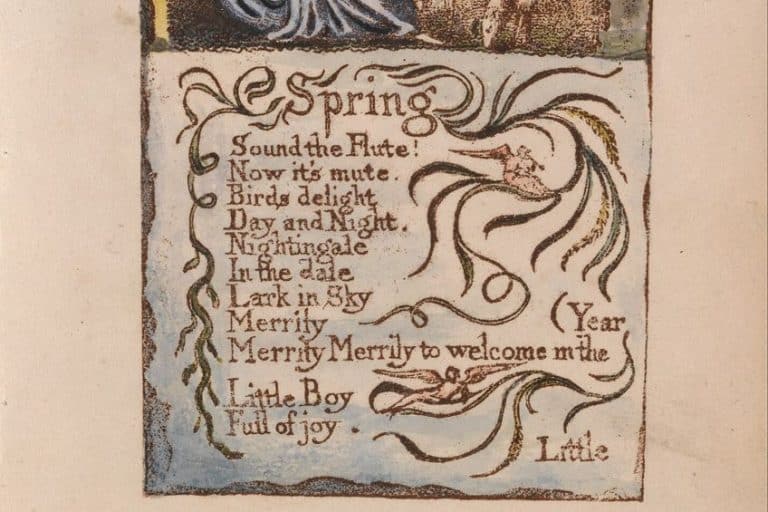Metaphor Poems – The Top 15 Famous Examples
Metaphors can be found throughout many poems, and this alone is a good reason to seek some of those poems out. Today, we will have a look at 15 different metaphor poems in mild detail so that you can have an array of potential poems to read, analyze, and enjoy. There are far more poems with metaphors than those listed here, but this should be a good place to start if you want to experience some great metaphors!
Table of Contents
- 1 A List of Metaphor Poems
- 1.1 Sonnet 130: My mistress’ eyes are nothing like the sun (1609) by William Shakespeare
- 1.2 Death Be Not Proud (1633) by John Donne
- 1.3 A Poison Tree (1794) by William Blake
- 1.4 She dwelt among the untrodden ways (1800) by William Wordsworth
- 1.5 Ode to a Grecian Urn (1819) by John Keats
- 1.6 The Raven (1845) by Edgar Allan Poe
- 1.7 When I Heard the Learn’d Astronomer (1865) by Walt Whitman
- 1.8 Dover Beach (1867) by Matthew Arnold
- 1.9 Waiting for the Barbarians (1904) by C.P. Cavafy
- 1.10 Birches (1915) by Robert Frost
- 1.11 Harlem (1951) by Langston Hughes
- 1.12 The Thought Fox (1957) by Ted Hughes
- 1.13 The Colossus (1960) by Sylvia Plath
- 1.14 Muliebrity (1960s) by Sujata Bhatt
- 1.15 Marrysong (1989) by Dennis Scott
- 2 Frequently Asked Questions
A List of Metaphor Poems
Metaphor is something that is immensely common in many different literary texts. They are hardly exclusive to poetry, although a good poetry example of metaphor is generally a great thing to see. This list of poems should give you a good overview of the kinds of things that metaphor poems may wish to explore. We will not discuss these in particular depth but instead, give you a series of 15 poems that you can peruse and analyze for yourself to see what you can learn from this collection of phenomenal poems with metaphors.

Sonnet 130: My mistress’ eyes are nothing like the sun (1609) by William Shakespeare
| Date Published | 1609 |
| Type of Poem | Shakespearean sonnet |
| Rhyme Scheme | ABABCDCDCEFEFGG |
| Meter | Iambic pentameter |
| Topic | Beauty |
Sonnet 130: My mistress’ eyes are nothing like the sun is a poem made up of a variety of similes and metaphors. For instance, the very first line, which is also the title of the poem, is a simile rather than a metaphor. However, much of the poem contains one direct grammatical comparison after another. The entire poem is comprised of these comparisons for the purpose of creating an image of unattractiveness so that it can ultimately conclude by stating that physical attractions do not matter when compared to inner beauty. The metaphors that are made include one that states that her hairs are black wires that grow on her head.
This is far from the only comparison that is made, and they are pervasive throughout the poem as a whole.
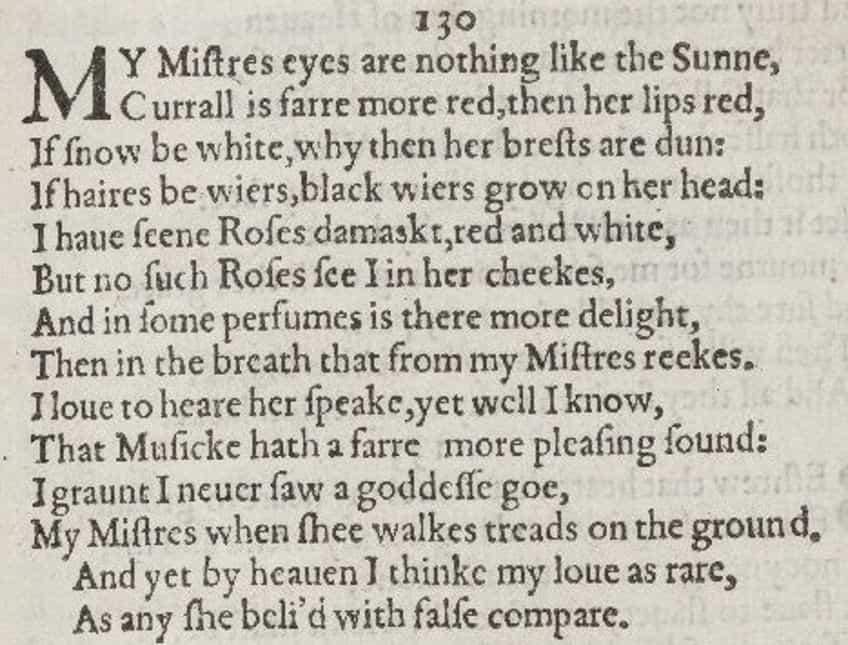
Death Be Not Proud (1633) by John Donne
| Date Published | 1633 |
| Type of Poem | Sonnet |
| Rhyme Scheme | ABBA ABBA CDDCEE |
| Meter | Iambic pentameter |
| Topic | Death |
Death Be Not Proud is a poem that makes use of a metaphor in its very first line. This can be found in a number of metaphor poems as many metaphors are often presented to the reader front and center. In this case, the poem makes use of a kind of personification with regard to the idea of death. It presents us with Death as representative of a person, but then uses other terms, such as referring to Death as a slave. These metaphorically represent Death as something other than a force of nature, but rather as something that feels and experiences some kind of existence of its own.
We often find poems and other texts that present Death as a person, and this is simply one of the best-known examples of this kind of mentality.

A Poison Tree (1794) by William Blake
| Date Published | 1794 |
| Type of Poem | Descriptive poem |
| Rhyme Scheme | AABB |
| Meter | Variable |
| Topic | Repression |
A Poison Tree is a superb poetry example of metaphor as it uses the metaphor of the title, a poisoned tree, throughout the poem. The anger of the speaker in the poem is depicted as a tree that grows with his fury, and it eventually comes to bear vengeful fruit. This is a very simple and direct metaphor that can be easily understood. We take one idea, like anger, and understand how it can grow and develop over time, and we simply take another thing in the world that also grows and develops. This works on another level too because trees are generally seen as something natural and positive. A tree is a beautiful thing. And by transplanting human rage onto a tree, we have poisoned the idea of the natural world itself.
This renders it an even more powerful comparison.
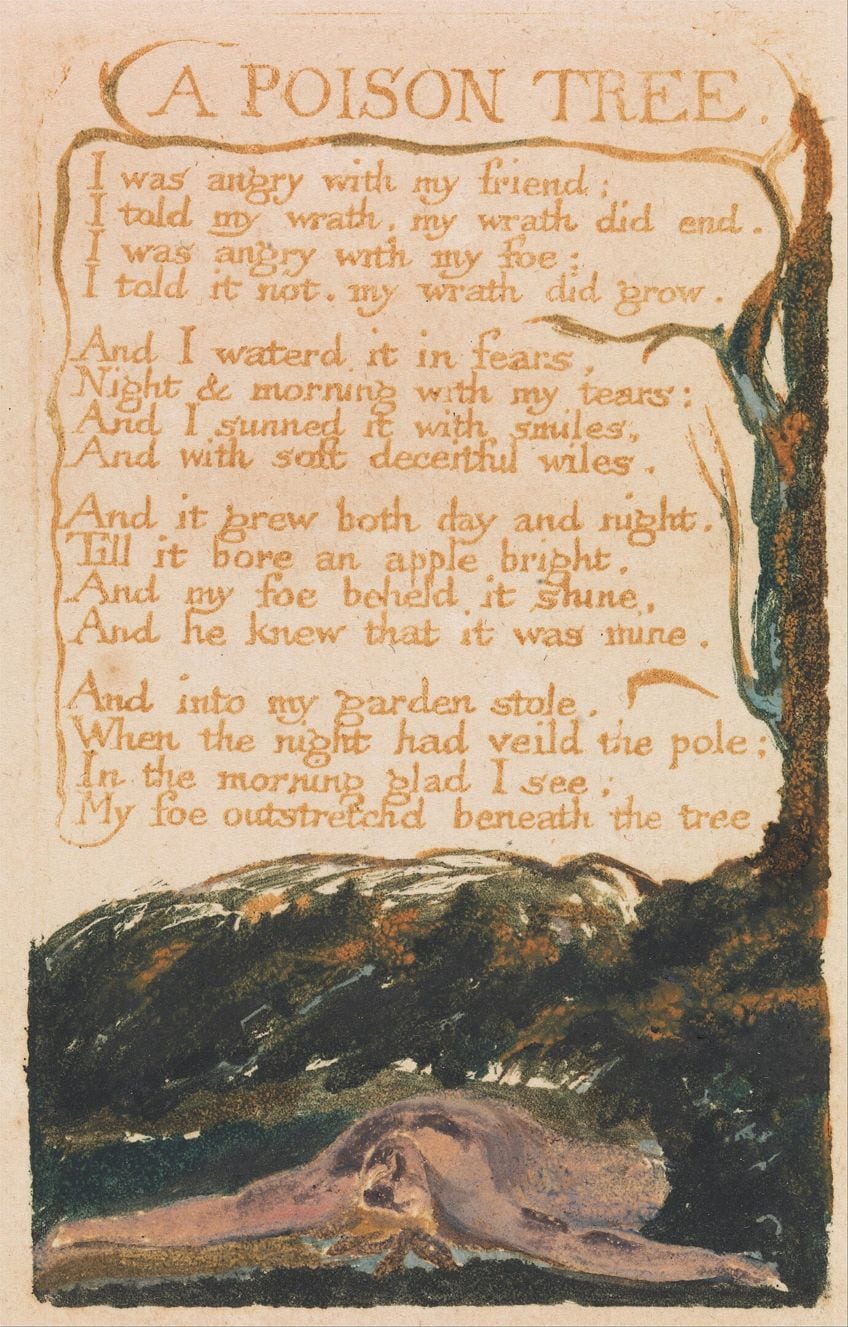
She dwelt among the untrodden ways (1800) by William Wordsworth
| Date Published | 1800 |
| Type of Poem | Elegiac poem |
| Rhyme Scheme | ABAB |
| Meter | Alternating iambic tetrameter and iambic trimeter |
| Topic | Beauty |
She dwelt among the untrodden ways is a beautiful poem that has certain similarities to Shakespeare’s My mistress’ eyes are nothing like the sun. The poem discusses a woman whom the speaker loves and adores. However, she is repeatedly depicted as someone who is not necessarily all that beautiful or special. She is seen as someone who is only truly beautiful when there is no one else around. It is not a particularly flattering literary portrait. However, when describing this woman, she is called “a violet by a mossy stone” that is nearly hidden from us.
The use of a beautiful flower alongside the more mundane existence of moss makes us understand the viewpoint the speaker has of this woman as a hidden gem of a person who is usually overlooked by others, but if you find her, you will encounter someone more beautiful than anyone else.
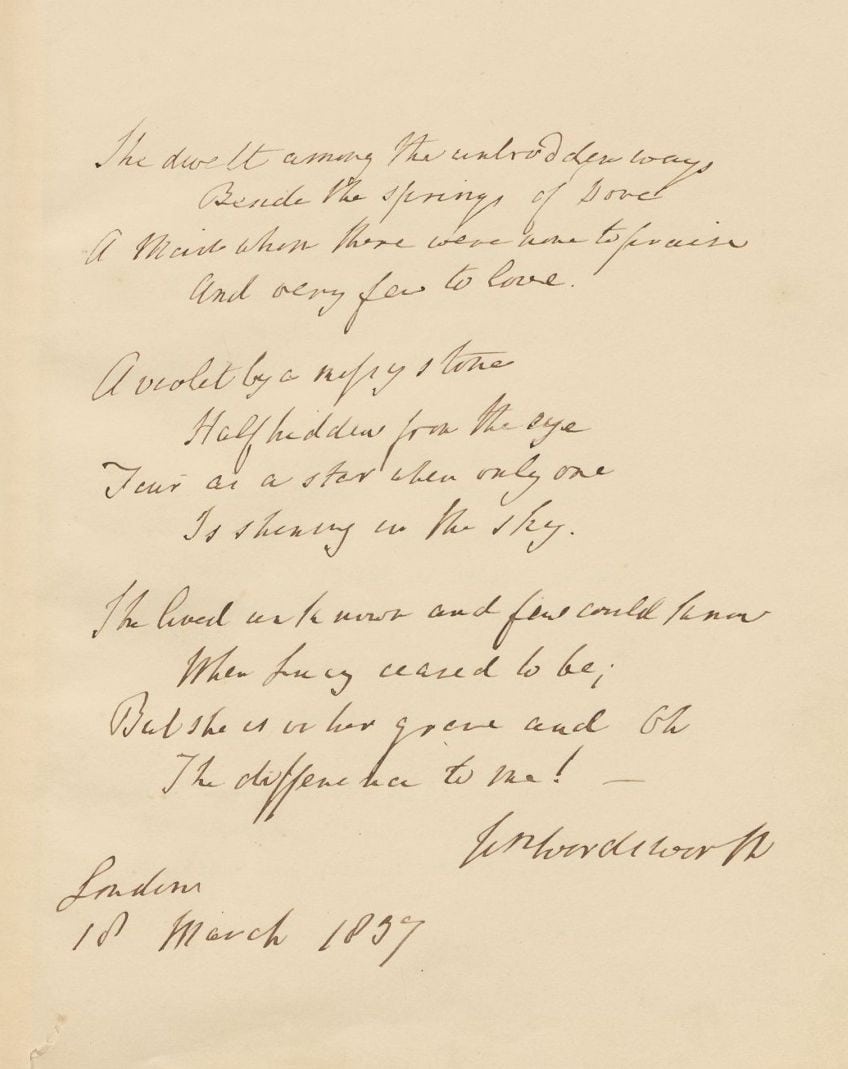
Ode to a Grecian Urn (1819) by John Keats
| Date Published | 1819 |
| Type of Poem | Ode |
| Rhyme Scheme | ABAB (variable) |
| Meter | Iambic pentameter |
| Topic | The nature of art |
Ode to a Grecian Urn is often considered to be one of the greatest Romantic poems by one of the most notable Romantic poets. It also includes a number of metaphors to make it one of the best Romantic examples of metaphor poems as a whole. It is a poem that highlights the beautiful artistry of a Grecian urn. This urn comes to represent certain things. Various metaphors are used, such as directly comparing it to a bride that holds secrets and a foster child that stands as the product of its own environment.
While some poems make use of only a handful of metaphors, there are a number of them throughout this poem, and they all aid in conveying the message that the poem wants to convey to us that this urn is a representation of a certain time and place and that it represents something far deeper about art itself.
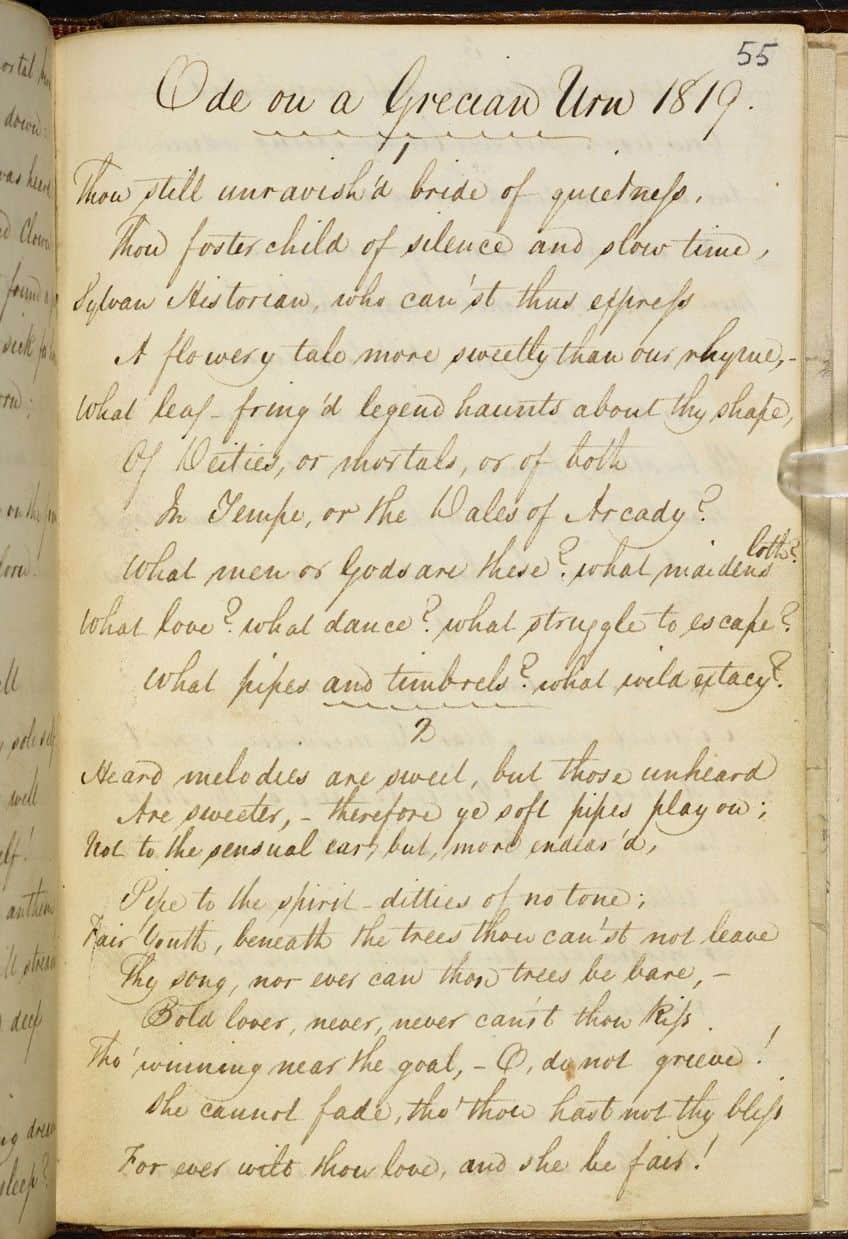
The Raven (1845) by Edgar Allan Poe
| Date Published | 1845 |
| Type of Poem | Narrative poem |
| Rhyme Scheme | ABCBBB |
| Meter | Trochaic octameter |
| Topic | Grief and loss |
The Raven is a fantastic example of metaphor in poetry. The reason for this is that the eponymous Raven represents something that is somewhat unknowable. It does not have a definitive meaning, but the bird that appears before the speaker is a harbinger of doom and grief. The speaker is, prior to the arrival of the Raven, grieving the loss of his beloved. The Raven comes to represent something to him. He cannot tell whether the Raven is some kind of a creature of the night or whether it is a simple bird, but it only speaks one word to him, and that word sounds like the name of his recently deceased lover.
The ambiguity of the Raven that taps on his window aids the Gothic air of the poem as a whole because the bird can represent many things, but we are not given definitive answers about what exactly they represent.
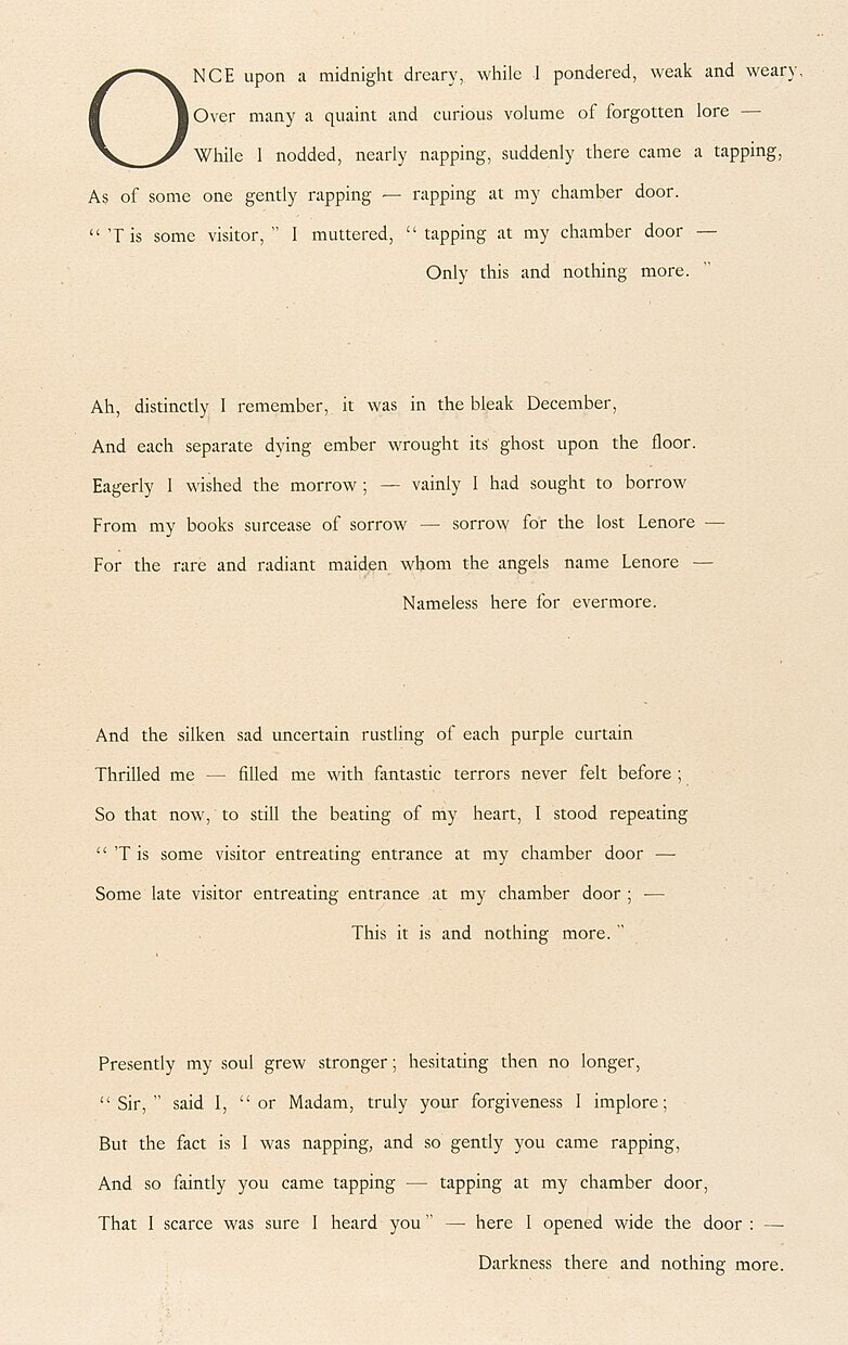
When I Heard the Learn’d Astronomer (1865) by Walt Whitman
| Date Published | 1865 |
| Type of Poem | Free verse |
| Rhyme Scheme | None |
| Meter | None |
| Topic | Imagination and science |
When I Heard the Learn’d Astronomer is a poem that one may not necessarily immediately associate with metaphors as it does not directly compare the astronomer to anything in particular. Instead, the poem depicts a man who attends a lecture by an astronomer, and this learn’d man explains the cosmos. The speaker eventually departs the lecture so that he may look up at the heavens on his own. This shows that the astronomer actually does represent something. He is a metaphor for the more scientific and academic perspective of the world that has grown since the Enlightenment. The astronomer represents the need to strip away the mystique and magic in the world and instead explain it in scientific terms.
The speaker wants to escape that kind of explanation, but the pervasiveness of this new scientific perspective cannot be easily eluded.
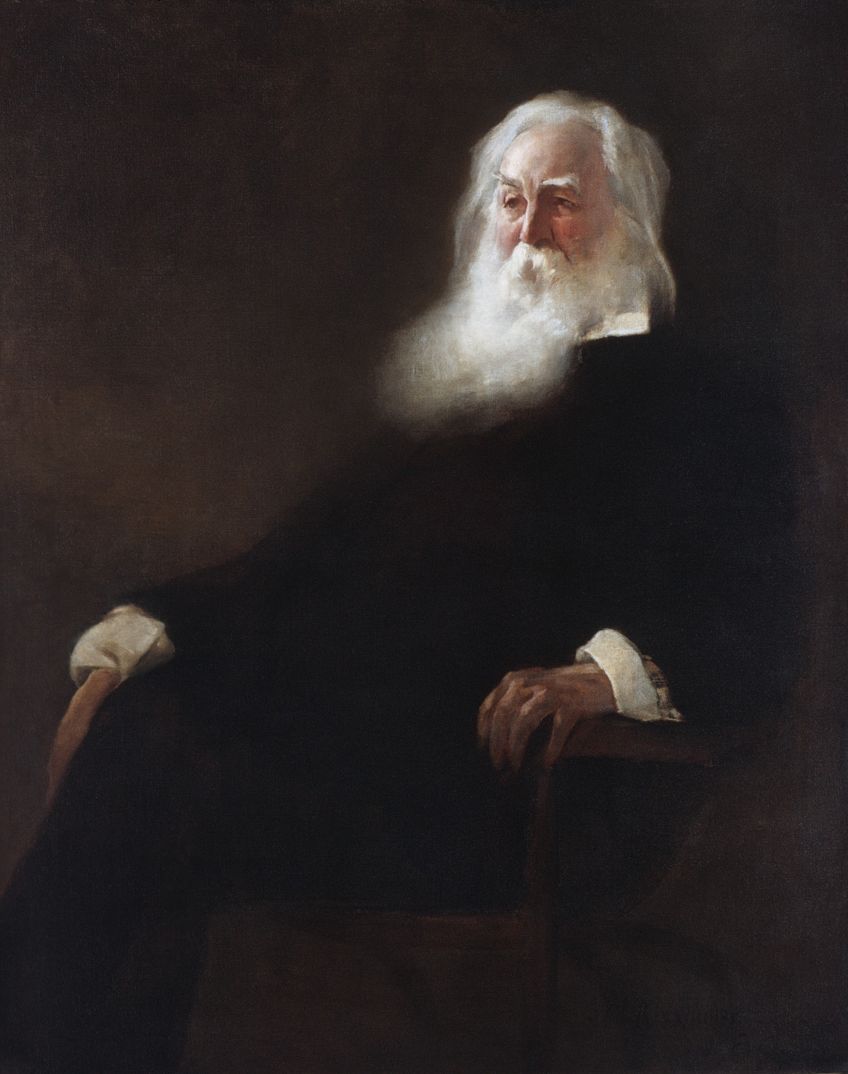
Dover Beach (1867) by Matthew Arnold
| Date Published | 1867 |
| Type of Poem | Lyric poem |
| Rhyme Scheme | Irregular |
| Meter | Variable |
| Topic | Uncertainty |
Dover Beach is one of the best metaphor poems because it is a highly allegorical poem that does not make much use of literal images. Instead, the poem uses the image of the ocean as something that comes to represent humanity as a whole. The oceans move and shift as humans do, and the most important of the images of the ocean is that of the Sea of Faith. This is not a real sea at all, but rather one that is ebbing further away from the speaker and the world as a whole. It is slowly disappearing in favor of the increased secularization that was growing during this period of time. This poem can be seen, in some ways, as similar to the previous poem in this list.
They both operate along the level of seeing the advancement of the sciences as a potentially negative thing.
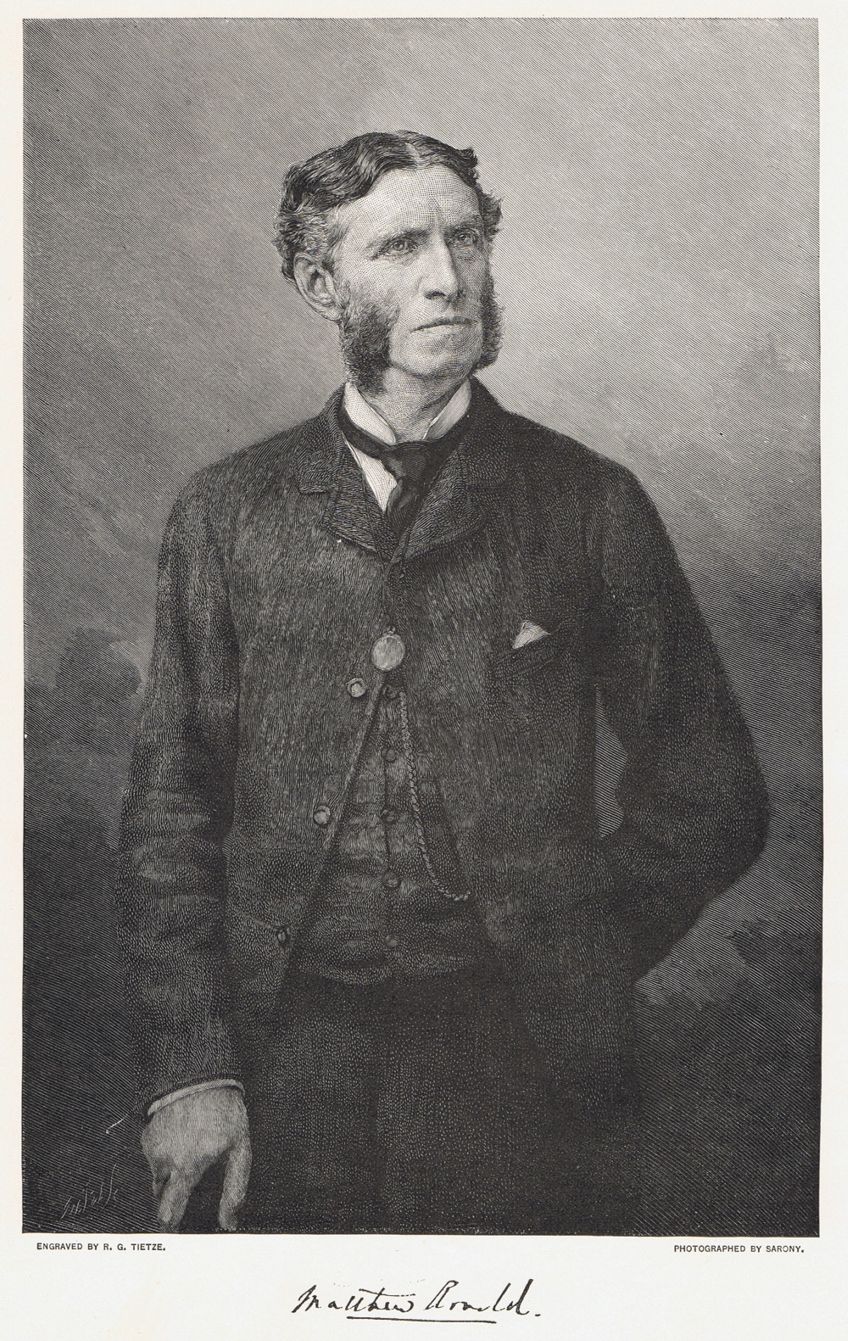
Waiting for the Barbarians (1904) by C.P. Cavafy
| Date Published | 1904 |
| Type of Poem | Free verse |
| Rhyme Scheme | None |
| Meter | Variable |
| Topic | The unknown |
Waiting for the Barbarians is a poem that is probably not as well-known as the book by J.M. Coetzee that is named after it. However, this poem is a phenomenal instance of a metaphor poem. The poem depicts a society, which is modeled after Roman society, that is in stasis as it waits for the barbarians to arrive and change everything. The barbarians represent an encroaching uncertainty. They represent change that could unfold into the world and, while the people fear these changes, they are also a possible source of positivity. Sometimes change needs to occur, and the poem even concludes by stating that the barbarians have become a kind of solution for the woes of the society that is waiting for them to arrive.
The barbarians are not presented as if they are a metaphor but are rather shown in a highly matter-of-fact tone.
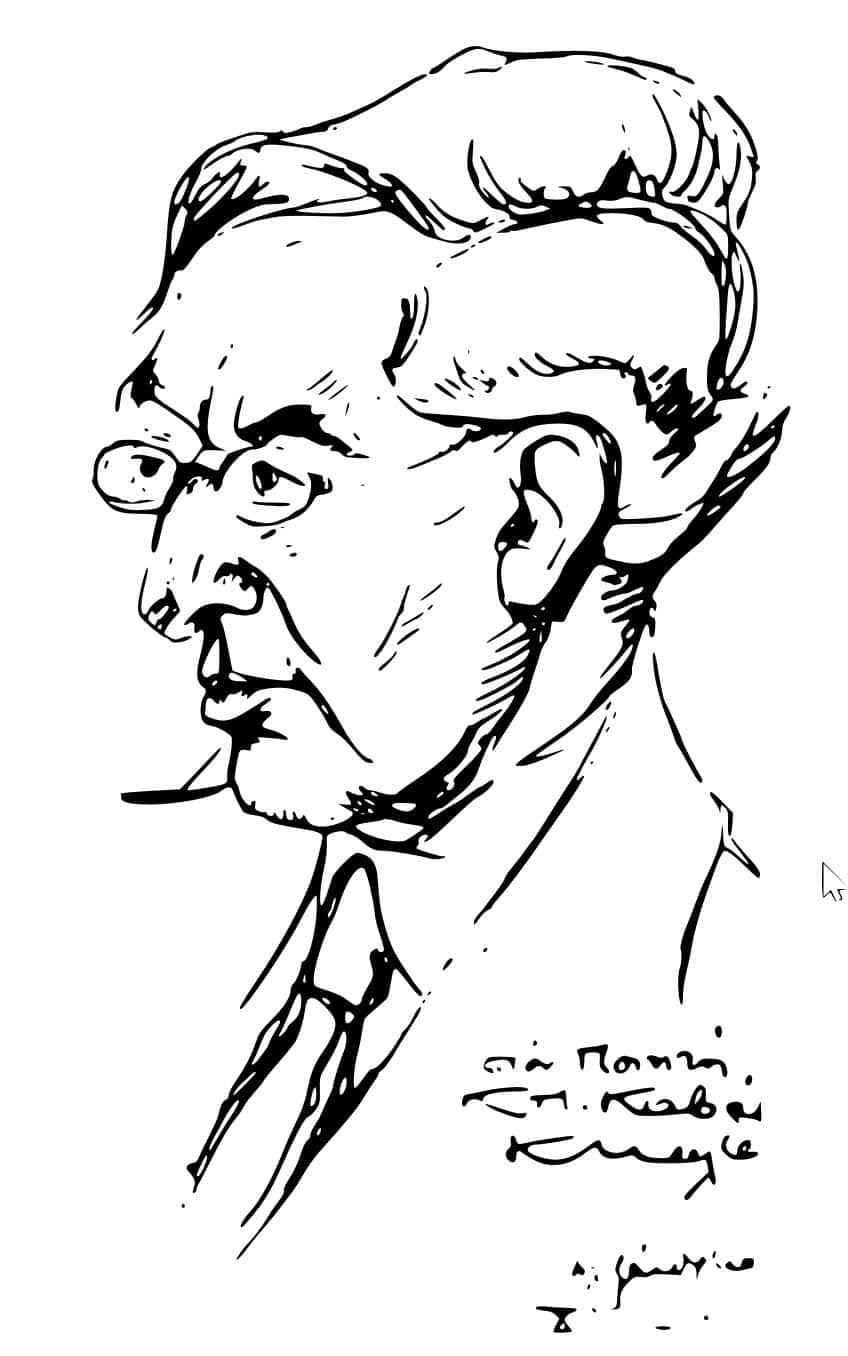
Birches (1915) by Robert Frost
| Date Published | 1915 |
| Type of Poem | Blank verse |
| Rhyme Scheme | None |
| Meter | Iambic pentameter |
| Topic | Birches |
Birches is one of the most famous poems by an already famous poet, and this poem makes use of the image of birch trees as a representation of life itself. The trees bend under the weight of the ice and snow that falls upon them, but they remain firm and strong once the ice has melted. These birches come to represent human strength in the face of adversity. One image can be seen as representative of one thing while another is representative of another. So, the trees are life, and the ice is adversity. Metaphors can often be used in this way as a direct stand-in for one or another thing.
This can also render poems that use metaphors in this way as far easier to understand.
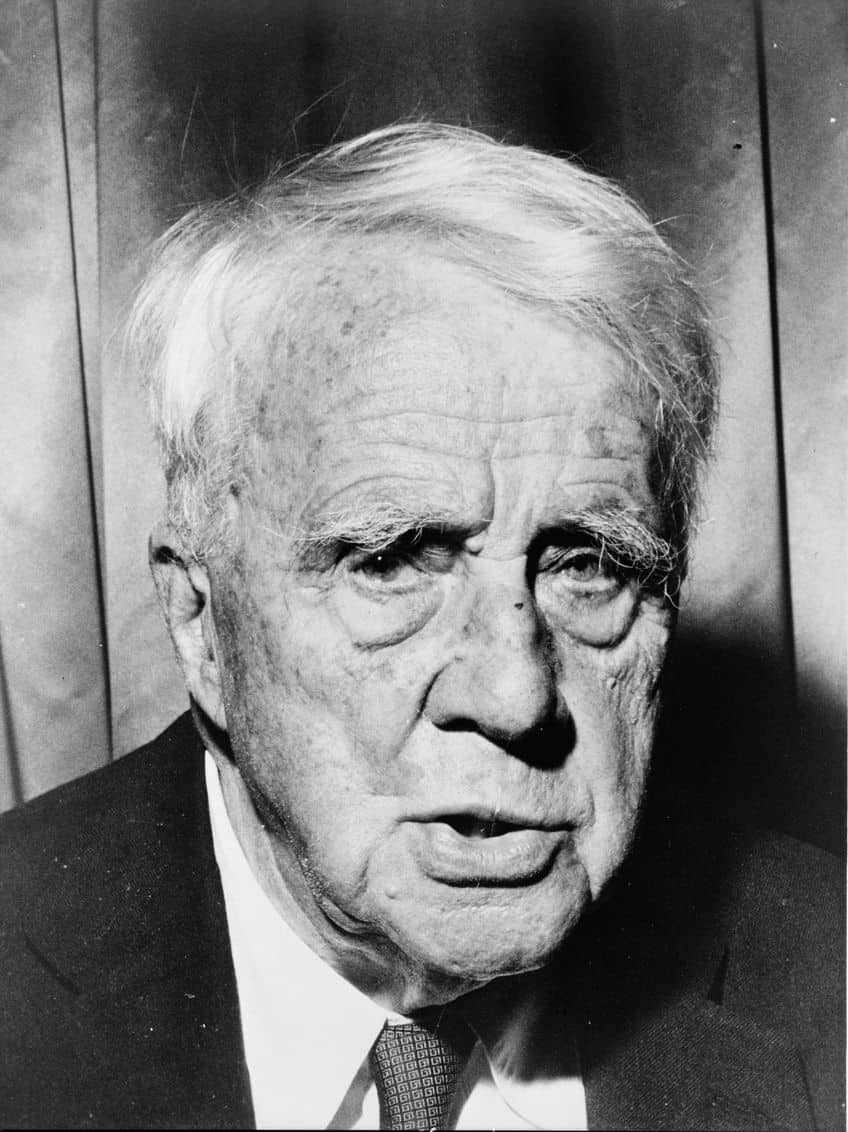
Harlem (1951) by Langston Hughes
| Date Published | 1951 |
| Type of Poem | Lyric poem |
| Rhyme Scheme | Variable |
| Meter | None |
| Topic | African American experience |
Harlem is a poem that uses a question as a metaphor. It demands an answer to the question: “What happens to a dream deferred?”. This does not actually mean a real dream, as in a thing that you experience while you are sleeping. Instead, the “dream” is a representation of equality. This is one of the greatest poems of the Civil Rights Movement era in the United States, and that dream is the dream of African American people having the equality that they were promised. The remainder of the poem asks a number of questions that relate to that metaphorical dream of the African American people.
It is a potent and unflinchingly painful metaphor that has turned this poem into a powerful demand for equality.
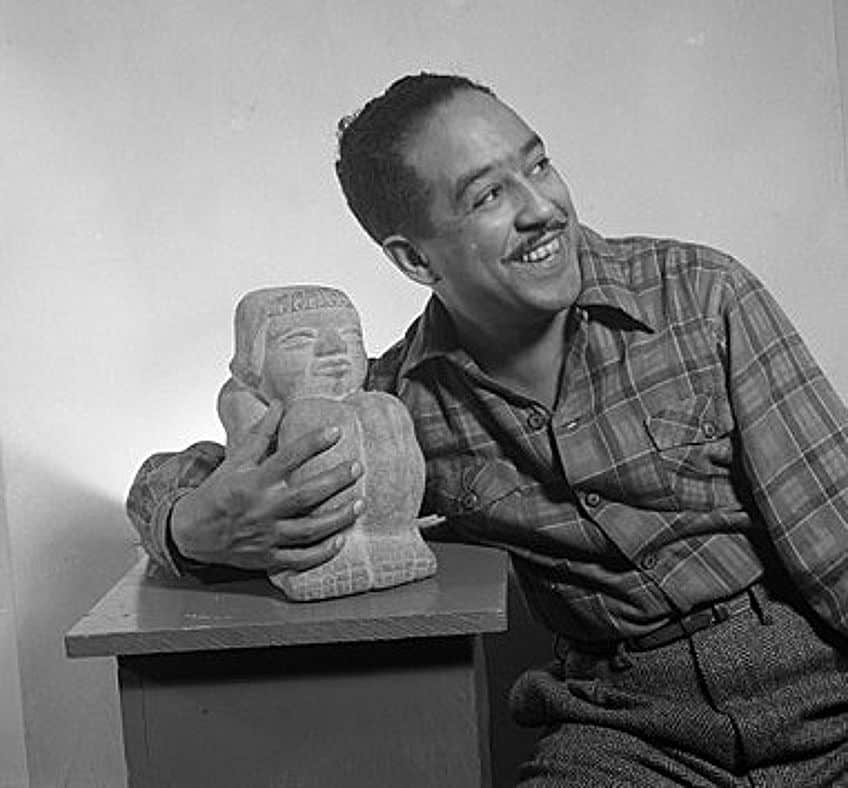
The Thought Fox (1957) by Ted Hughes
| Date Published | 1957 |
| Type of Poem | Free verse poem |
| Rhyme Scheme | None |
| Meter | None |
| Topic | Poetry writing |
The Thought Fox is a rather meta-poetic text, and as far as metaphor poems go, it is rather unique in that it uses its metaphor as a representation of the act of writing poetry itself. The fox in question is not a real fox, but rather one that exists within his thoughts, and one that he uses as inspiration for what he puts on the page. We have often made use of metaphors in this way to show how we feel about certain things. This is one of the ways that metaphors can be so well-used in poetry. They allow us to use unreal elements to help us cope with and understand aspects of ourselves and our own world. This is also where many allegorical texts come from.
This is not one of the best-known metaphor poems, but it is indicative of the kinds of things that metaphors can be used for.
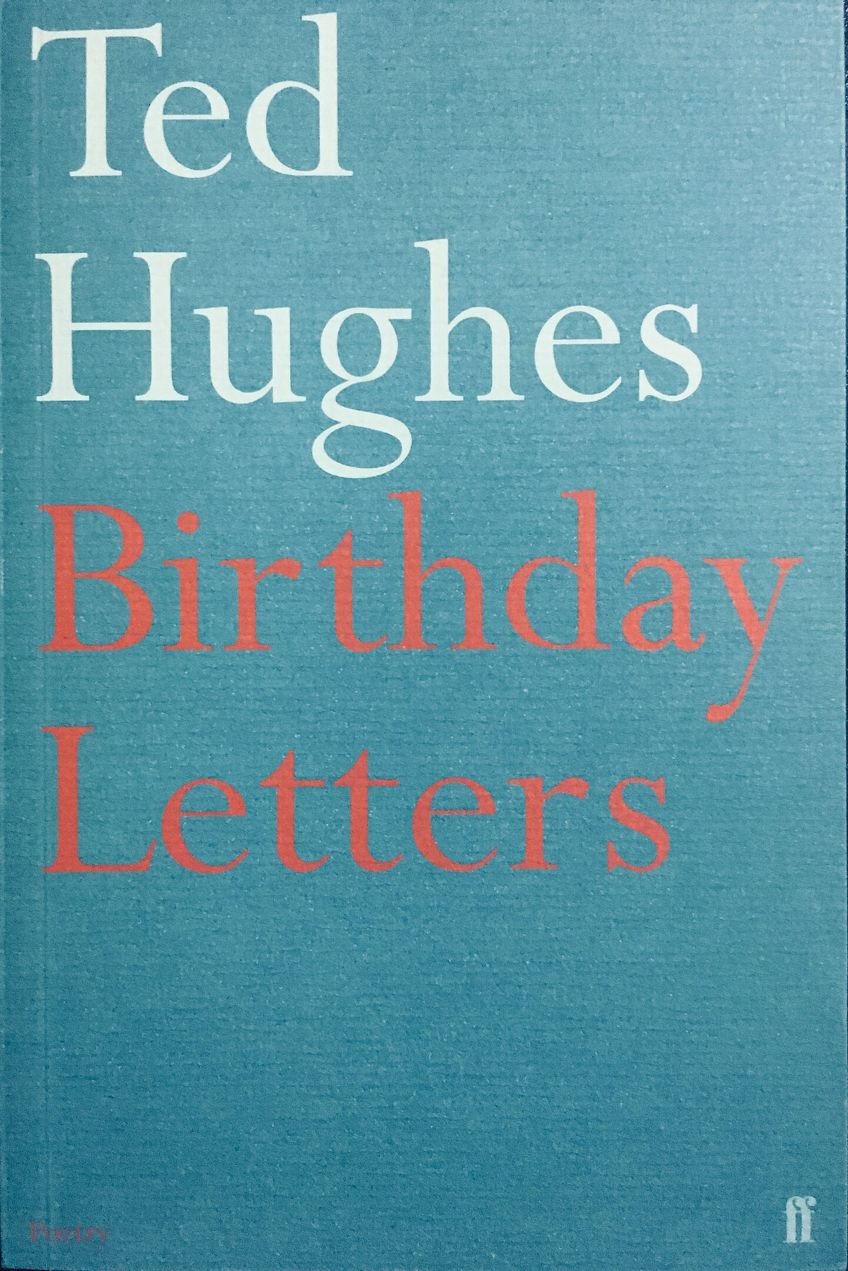
The Colossus (1960) by Sylvia Plath
| Date Published | 1960 |
| Type of Poem | Free verse |
| Rhyme Scheme | None |
| Meter | None |
| Topic | Fathers |
The Colossus is a metaphor poem that uses the image of a great statue to represent the speaker’s father. For those unfamiliar with the Colossus, it was a statue that once existed as one of the Seven Wonders of the Ancient World, and it stood in the harbor of Rhodes. It was a massive and impressive statue that watched over the city, and in this poem, Plath has likened her own father to this great and powerful statue. This is far from the only poem that she wrote about her father, and her words about this man are not generally all that positive. This is another example of that same mentality.
The use of a statue as a metaphor to represent an imposing father figure is one that likely resonates with many in our world.
Muliebrity (1960s) by Sujata Bhatt
| Date Published | 1960s |
| Type of Poem | Free verse |
| Rhyme Scheme | None |
| Meter | None |
| Topic | Feminine empowerment |
Muliebrity is an interesting poem because it is a narrative of sorts about a woman who does a rather disgusting job. She picks up cow dung and takes it somewhere else. She is not a cleaner. There is clearly a purpose to this dung, but one that we may not necessarily know. However, she is portrayed as powerfully feminine for this seemingly unfeminine job of hers. The thing that makes this very interesting is that the speaker states that she has been “unwilling to use her as a metaphor”, but her place in this poem has rendered her into a kind of metaphor regardless of the poet’s intentions. This girl who picks up this dung is representative of a kind of feminine empowerment.
She may have been a real person, but she has come to represent something in the mind of the speaker, and perhaps in our own minds too.
Marrysong (1989) by Dennis Scott
| Date Published | 1989 |
| Type of Poem | Loose sonnet |
| Rhyme Scheme | None |
| Meter | None |
| Topic | Relationships |
Marrysong is a poem that uses an extended metaphor throughout. The poem is about the way in which we are not the same people throughout our lives, and when we fall in love with someone, they will never remain the same. As the years tick by, we change, and so do those we love, and this poem points that out as a positive. It uses the metaphor of geography to understand this. The mind of the speaker’s lover is an eternally changing landscape, and he is a cartographer who must try to understand it even if it will simply change again over the years. He must be the eternal explorer, trying to map her mind, as her mind continually alters and shifts. We could also presume that she would need to do the same with him.
Today, we have looked at 15 different poems with metaphors to give you a nice introductory list of the kinds of metaphors that can be found in poetry. There are far more than only those that have been listed, but this should give a good overview for those who want to find a few metaphor poems to read. Many of the authors listed above have written many other poems with metaphors, but you will have to find those on your own!
Frequently Asked Questions
What Is a Metaphor?
This is a type of comparison that can exist within language. The idea is that this is a direct comparison that connects two or more things together. On a grammatical level, this can mean stating something like: The bed is an oasis. It is not literally an oasis, but we come to understand that it represents something in our minds. It is figurative language rather than being literal. However, the metaphor can be extended in literature, such as making an entire character represent some kind of an idea.
How Does a Metaphor Differ from a Simile?
Many confuse a metaphor and a simile. However, it is actually quite simple to tell the difference. They are both comparisons between two things, but a simile needs to include one of two words to be a simile. It requires the use of like or as to make it a simile. A metaphor, on the other hand, requires no specific aspects of language to create this kind of a comparison. It often entails stating that one thing is another thing, but it is that other thing on a figurative level.
What Is a Metaphor Poem?
If a poem makes use of a metaphor in some or another way, it can be seen as a poetry example of metaphor. There are many poems with metaphors in the world as much of poetry is figurative, and figurative language is metaphorical in nature. However, there is no such thing as a class of poetry known as metaphor poems like there is a variety known as sonnets or limericks. Any kind of poem can be used to convey metaphors. So, poems with metaphors can be anything!
What Are Some of the Most Famous Poems With Metaphors?
Some of the most famous metaphor poems include Death Be Not Proud (1633) by John Donne, Dover Beach (1867) by Matthew Arnold, and The Colossus (1960) by Sylvia Plath. However, this is a tiny array of the full scope of poems with metaphors. We can often find a solitary poetry example of metaphor within a poem, or we can find many, and there is no real limit to where they can be found.
What Is an Allegory?
This is a story of some kind, and it can exist within poetic form, in which something comes to represent something on a larger scale. This is a kind of extended metaphor. An easy example to illustrate this would be something like Animal Farm (1945) by George Orwell. Each of the animals comes to represent a specific group within society, and as a result, there is an extended metaphor that runs throughout the course of the narrative. This can be found in poetry and is another way to make use of metaphor in poetry.
Justin van Huyssteen is a freelance writer, novelist, and academic originally from Cape Town, South Africa. At present, he has a bachelor’s degree in English and literary theory and an honor’s degree in literary theory. He is currently working towards his master’s degree in literary theory with a focus on animal studies, critical theory, and semiotics within literature. As a novelist and freelancer, he often writes under the pen name L.C. Lupus.
Justin’s preferred literary movements include modern and postmodern literature with literary fiction and genre fiction like sci-fi, post-apocalyptic, and horror being of particular interest. His academia extends to his interest in prose and narratology. He enjoys analyzing a variety of mediums through a literary lens, such as graphic novels, film, and video games.
Justin is working for artincontext.org as an author and content writer since 2022. He is responsible for all blog posts about architecture, literature and poetry.
Learn more about Justin van Huyssteen and the Art in Context Team.
Cite this Article
Justin, van Huyssteen, “Metaphor Poems – The Top 15 Famous Examples.” Art in Context. January 8, 2024. URL: https://artincontext.org/metaphor-poems/
van Huyssteen, J. (2024, 8 January). Metaphor Poems – The Top 15 Famous Examples. Art in Context. https://artincontext.org/metaphor-poems/
van Huyssteen, Justin. “Metaphor Poems – The Top 15 Famous Examples.” Art in Context, January 8, 2024. https://artincontext.org/metaphor-poems/.


